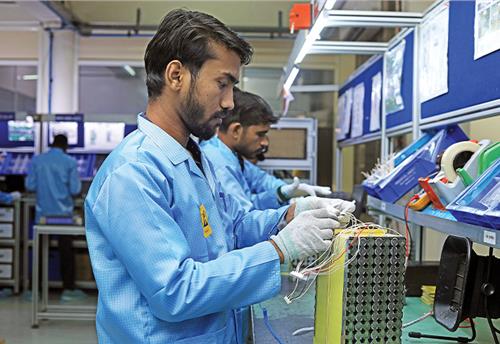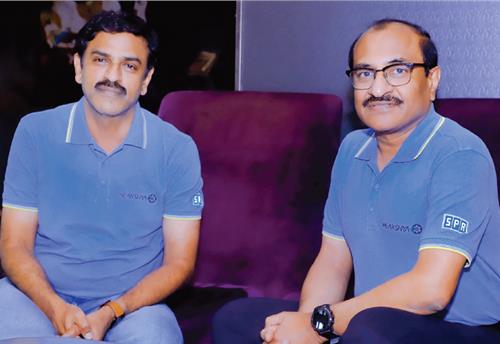Ashok Leyland trains a million drivers and counting…
Ashok Leyland recently trained over a million drivers through its training programme ever since it began in 1995.
Since opening its driver training programme in 1995, the commercial vehicle major has trained over a million drivers across the country in essential safe driving skills and is doing its bit and more to make the profession attractive to young Indians.
Roads are the dominant mode of transportation in India, carrying almost 85 percent of the country’s passenger traffic and more than 60 percent of its freight. Over the past two decades, India has developed a network of expressways and highways albeit most roads are narrow and congested with poor surface quality making driving a challenging affair and calling for skilled drivers to do the job at all times.

A classroom training session on rules and safety in progress.
Driving a commercial vehicle, especially an M&HCV or bus, on Indian roads and highways needs special skills, given the road conditions, callous pedestrians and even meandering cows in most parts of the country. This while transporting tonnes of goods or several passengers. It’s no secret that India’s transport and logistics industry is facing an acute shortage of skilled drivers. This was an issue that Ashok Leyland recognised very early on and way back in 1995 set up the Ashok Leyland Driver Training programme by opening a state-of-the-art Driver Training Institute (DTI) at Namakkal in Tamil Nadu.
Today, there are eight such DTIs in Burari (Delhi), Chhindwara (Madhya Pradesh), Kaithal (Haryana), Bhubaneswar (Orissa), Railmagra (Rajasthan), Dharwad (Karnataka), Bengaluru (Karnataka), and Ranoli (Gujarat) and two more under construction. The DTIs have undertaken the responsibility of imparting training in safe driving techniques to CV drivers in India. In the 23 years since then, Ashok Leyland has trained more than a million drivers in its institutes. A laudable effort, indeed.
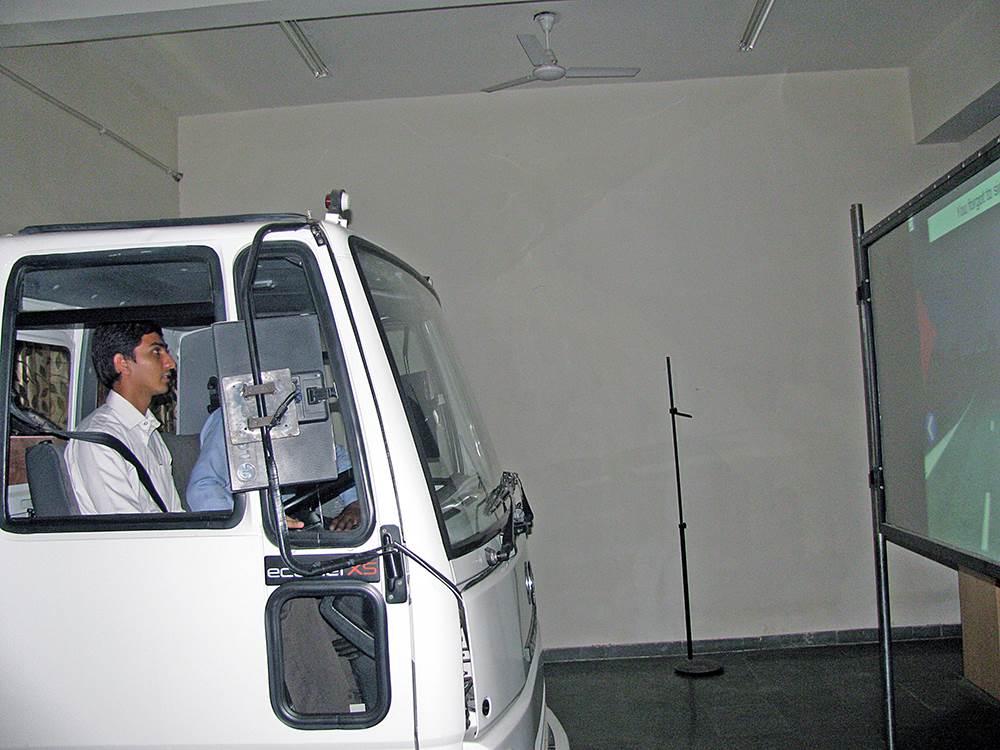
Students undergoing primary training on a simulator.
These institutes have now evolved as centres of excellence, where the drivers are taught the essential skills of handling a CV and also sensitised to the responsibility of holding life, both on and off the road. The well-rounded training curriculum at the institute covers all aspects of driving and varies from training for beginners to refresher course training, fuel saving techniques to the safe transportation of hazardous goods. All service-training centres are equipped with the latest aggregates, general and special tools, technical handouts and audio-visual equipment that is continuously updated. All the institutes are also equipped with modern motion platform simulators for value-added training.
Speaking to Autocar Professional, Anuj Kathuria, president, Global Trucks, Ashok Leyland, says: “Being one of the largest CV manufacturers in the country, we believe that it is our duty to ensure safety on the Indian roads as professionally trained drivers can make a significant difference to the same. We have trained over 10 lakh drivers (1 million) and will continue to train them to cover all aspects of driving and road management, while also promoting a holistic approach to health, stress control, and overall well being.”
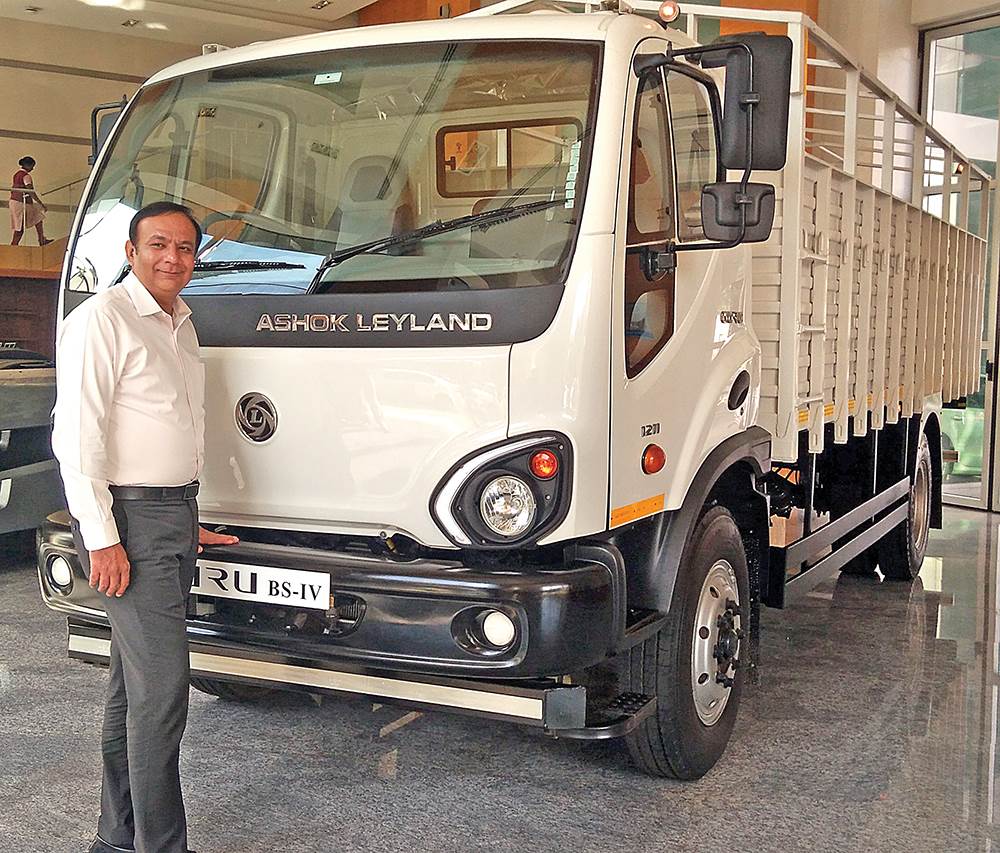
Anuj Kathuria: "We will continue training drivers in all aspects of driving and road management."
Road safety is at the forefront of the company’s driver training as unlike passenger cars or two-wheelers, trucks and buses cannot be used for training on any normal road due to their size and the safety of pedestrians. Hence, an exclusive driver training facility is necessary. Each driver training institute has an installed capacity to train 25,000 drivers in a year. The key element of driver training is the safety of the vehicle, passengers, expensive and hazardous goods. These training institutes are managed by Ashok Leyland as two models – company owned and company operated – at Namakkal and Vadodara and the other as a public-private model in partnership with state and central governments. These institutes are spread across 12 to 40 acres.
Intensive training
There are 14 types of courses including basic Light Motor Vehicle (LMV), Heavy Motor Vehicle (HMV), two days’ refresher for LMV-HMV, safe transportation of hazardous goods, training trainers of another driving school, fuel-saving courses and any other courses as mandated by the government. Course duration is from two days to three months.
Drivers are evaluated on 18 different skills criteria with theory and practical training as per the motor vehicle rules including different terrain, bends, U-turns, hill climbing, reverse, safe parking and night driving.
The course starts with LMV and after a year students are upgraded to the next level. The beginners work on simulators which help understand and practice real-world conditions in various driving modes. After logging a certain number of hours, the drivers learn to operate the trucks on the institute premises.
The basic training needs the students to reside at the Institute for a month. While the daily training involves a 9 am to 5 pm schedule comprising theory and practical classes, each student gets a minimum of 15 hours steering wheel practice inside the campus and outside. Besides driving, they are also trained to handle fire caused by chemicals and oil fire using different equipment and fire extinguishers.
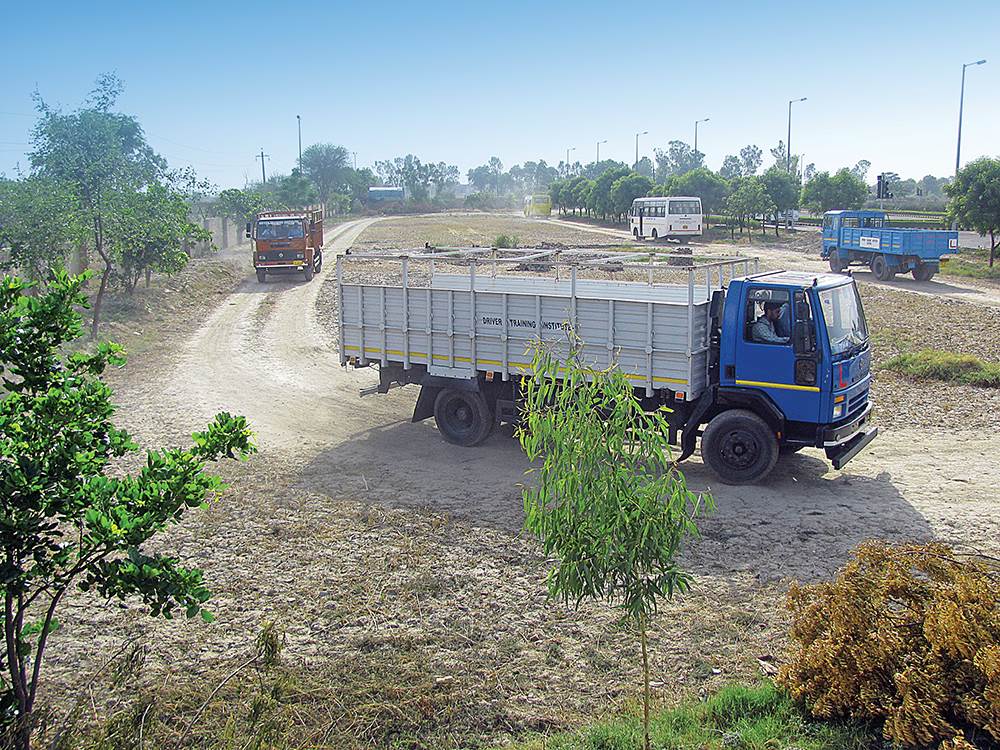
Intensive driver training is conducted on highways, hill-climbs, slopes, night driving and on actual roads outside the institute.
A driver needs to be in optimum health if he is capable to drive. Vision, blood pressure and diabetes lead to higher level of stress and accident-prone situations; therefore, each institute is equipped to test drivers for these issues. They also conduct yoga classes to help trainees manage stress.
All the DTIs are equipped with modern facilities including well-equipped classroom, traffic signal systems, and up to 4.5km of driving tracks depending upon the size of the institute. There are also test sections with single 1-2-6 lane tracks and various landscapes that cover all road combinations including hill, water, start-stop. The DTIs have the latest BS VI-compatible vehicles with various fuels and applications such as LCVs and HCVs in the form of reefers, tractor-trailers and rigid trucks, and also CNG-powered buses.
Demand-supply gap
It’s a well-known fact that India is facing a huge mismatch in the demand and supply of CV drivers. Not many youngsters are willing to join the profession due to the ‘stigma’, lack of social security, recognition of a driver’s contribution to society. Additionally, new employment opportunities have come up in cities with the advent of cab aggregator models.
Therefore, to attract prospective drivers, each DTI has appointed business development managers who visit villages and towns to scout for unemployed youth and school dropouts from the hinterland to conduct awareness campaigns where they explain the objective of the training and how it can help gain employment. DTIs are also closely associated with transport unions to get new recruits.
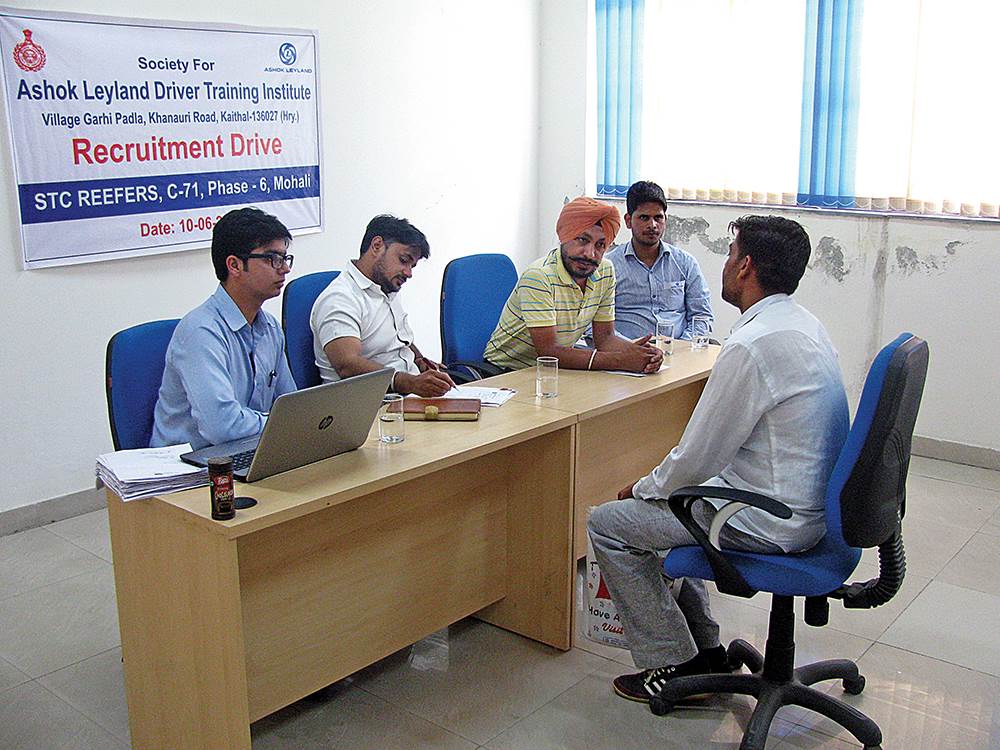
Ashok Leyland staffers visit villages to recruit unemployed youths
Speaking of the high demand for its courses, a company official says, “Our school in Kaithal had a waiting list of nearly 5,000 people. We doubled the capacity, increased the number of working hours, and added a number of vehicles, classrooms and instructors to reduce the vehicle list.” The fees charged for the training are nominal compared to the training, experience, and infrastructure provided. It ranges from Rs 7000-10,000 for non-residential and Rs 3,000-4,000 a month for residential.
Namakkal has also set the trend for women to join the driving profession and recent trends indicate that a good number of women are willing to undertake LMV training.
While the percentage of women drivers today is low, the next 5-10 years should see their numbers rise rapidly. In south India, the percentage of women going in for driver training is higher than the rest of the country.
Key challenges
Though Ashok Leyland is working rigorously towards training new generations of drivers, it does face challenges. Firstly, finding people for this profession is the biggest one. It is a psychological and social problem where the society badly needs skilled drivers in large numbers but at the same time has not been able to provide a medium to promote, cultivate, enhance and give them a secure life. A driver in India typically enters the profession because he has no other alternative – this is the biggest challenge today.
India needs to move away from this to create a channel for a person to aspire to become a driver – to do it out of his own free will and satisfaction. Ashok Leyland is trying to find out ways by conducting surveys on the lifestyle of drivers and identify as to what gives them comfort in opting to become a driver.
Apart from Ashok Leyland, a few other organised players have identified the severity of the problem of getting new drivers, training and skilling them appropriately. Clearly, these issues need urgent focus not only from the government and corporates but also society at large. Importantly, for India, there is a need to change the mindset of the masses towards the driver community. Driving should become part of our education system.
(This article was first published in the 15 May 2018 issue of Autocar Professional)
Also read: Ashok Leyland rolls out 100,000th BS IV vehicle
RELATED ARTICLES
BRANDED CONTENT: Eliminating the worries of battery charging with smart solutions
The charging infrastructure is the backbone of electric mobility but is also one of the key perceived barriers to EV ado...
The battery-powered disruptor
Greenfuel Energy Solutions is planning to shake up the EV battery market with the launch of a portfolio of specially eng...
SPR Engenious drives diversification at Shriram Pistons & Rings
The engine component maker is now expanding its business with the manufacturing of motors and controllers through its wh...





 09 Jun 2018
09 Jun 2018
 81062 Views
81062 Views



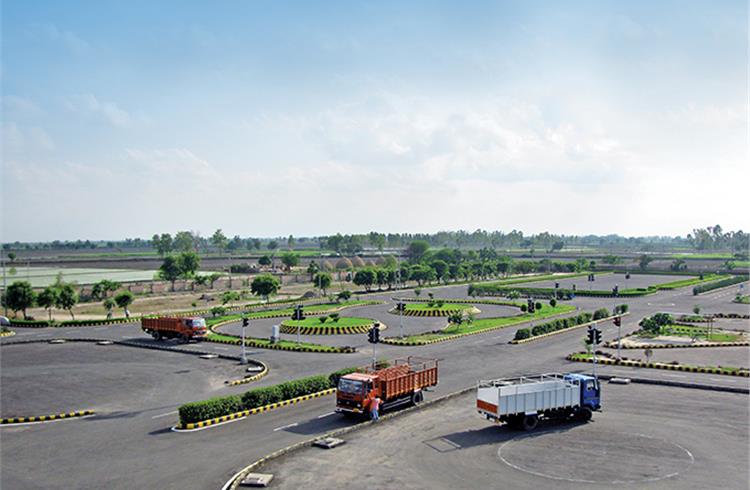
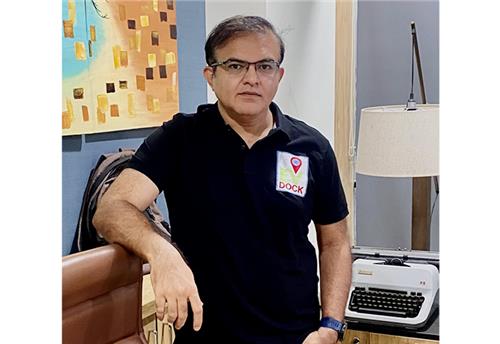
 Autocar Pro News Desk
Autocar Pro News Desk

